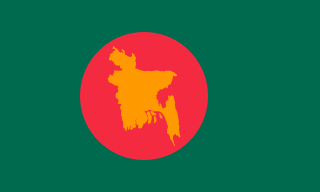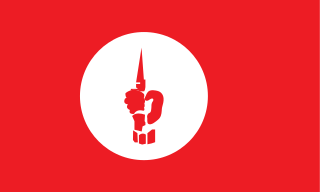Related Research Articles

The Bangladesh Armed Forces are the combined military forces of the People's Republic of Bangladesh. It consists of the three uniformed military services: the Bangladesh Army, the Bangladesh Navy and the Bangladesh Air Force. The Armed Forces are under the jurisdiction of Ministry of Defence of the Government of Bangladesh, and is directly administered by the Armed Forces Division of the Prime Minister's Office. The President of Bangladesh serves as the Commander-in-Chief of the Bangladesh Armed Forces. It has the third-largest defence budget in South Asia and according to the Global Firepower index it is the third most powerful military force in South Asia. Border Guard Bangladesh and Bangladesh Coast Guard are under the jurisdiction of the Ministry of Home Affairs during peacetime, but during wartime they fall under the command of Bangladesh Army and Bangladesh Navy respectively.

The Border Security Force (BSF) is India's border guarding organisation at it’s borders with Pakistan and Bangladesh. It is one of the seven Central Armed Police Forces (CAPF) of India, and was raised in the wake of the Indo-Pakistani War of 1965 "for ensuring the security of the borders of India and for related matters".

The Bangladesh Liberation War was a revolution and armed conflict sparked by the rise of the Bengali nationalist and self-determination movement in East Pakistan, which resulted in the independence of Bangladesh. The war began when the Pakistani military junta based in West Pakistan—under the orders of Yahya Khan—launched Operation Searchlight against the people of East Pakistan on the night of 25 March 1971, initiating the Bangladesh genocide.
Muhammad Ataul Goni Osmani, was a Bengali military leader. Osmani's career spanned five decades, beginning with service in the British Indian Army in 1939. He fought in the Burma Campaign during World War II. After the partition of India in 1947, he joined the Pakistan Army and served in the East Bengal Regiment, retiring as a colonel in 1967. Osmani joined the Provisional Government of Bangladesh in 1971 as the commander-in-chief of the nascent Bangladesh Forces. Regarded as the founder of the Bangladesh Armed Forces, Osmani retired as a four-star general from the Bangladesh Army in 1972.

The Liberation War Museum is a museum at Agargaon in Dhaka, the capital of Bangladesh, which commemorates the Bangladesh Liberation War that led to the independence of Bangladesh from Pakistan.
The Battle of Boyra was a ground and aerial battle that was fought on 22 November 1971 between the India and Pakistan.
The Battle of Dhalai was a battle fought between India and Pakistan before the formal start 1971 India-Pakistan War for the liberation of Bangladesh. The battle started after an attack by Indian army on Pakistani border outpost (BOP) in East Pakistan on 28 October and lasted until 3 November 1971. Three infantry battalions belonging to 61 Mountain Brigade, one battalion belonging to East Bengal Regiment and 7 Rajputana Rifles supported by an artillery sized brigade of Indian army fought against a battalion sized 12 Frontier Force of Pakistan army.
The Swadhin Bangla Biplobi Parishad was an armed underground student political group secretly organized in 1961 by Serajul Alam Khan, a key founder of Bangladesh, that worked to wage an armed secessionist struggle against Pakistani rule and achieve the independence of East Pakistan as "Bangladesh".
The Bangladesh Liberation War started on 26 March 1971 and ended on 16 December 1971. Some of the major events of the war are listed in the timeline below.

Mujibnagar, formerly known as Baidyanathtala (Boiddonathtola) and Bhoborpara, is a town in the Mujibnagar Upazila of Bangladesh. The Provisional Government of Bangladesh was formed on 10 April 1971, however, sworn in on 17 April 1971 in this place by the elected representatives of the Bengalees, that led the Bangladesh Liberation War, who were leading the guerrilla war for the independence of Bangladesh from Pakistan in 1971. The place was renamed Mujibnagar by the proclamation of independence, in honour of Sheikh Mujibur Rahman, who declared Bangladesh independent. The actual capital of the government while in exile was Calcutta. A memorial complex covering 20.10 acres (8.13 ha) has been built at the site where the ministers of that first government took their oaths.

Operation Chengiz Khan was the codename assigned to planned Pakistani air and land offensives into India during the Indo-Pakistani war of 1971. The plans for the operation were approved in September 1971.

Operation Jackpot was a codename for three operations undertaken by Bengali Mukti Bahini in former East Pakistan against the Federation of Pakistan during the climax of the Bangladesh Liberation War.

Bangladesh's military history is intertwined with the history of a larger region, including present-day India, Pakistan, Nepal, Bhutan and Myanmar. The country was historically part of Bengal – a major power in South Asia and Southeast Asia.
The Indian Army had no standby force ready in 1971 with the specific task of attacking East Pakistan, one of the many reasons why India did not immediately intervene after Pakistan launched Operation Searchlight in March 1971. Indian Army's Eastern Command was tasked with defending the northern and eastern borders and fighting the insurgencies in Nagaland, Mizoram and Naxalites in West Bengal at that time.

The Provisional Government of Bangladesh, popularly known as the Mujibnagar Government, was established following the declaration of independence of East Pakistan as Bangladesh on 10 April 1971. Headed by prime minister Tajuddin Ahmad, it was the supreme leadership of the Bangladeshi liberation movement, comprising a cabinet, a diplomatic corps, an assembly, an armed force, and a radio service.

Prior to Bangladesh Liberation War in 1971, India had no plans for large scale military action in East Pakistan. Since the Sino-Indian War of 1962, the primary objective of the Indian Army Eastern Command was the defence of the Indian northern and eastern borders, defending the "Shiliguri Corridor", and on combating insurgencies raging in Mizoram, Nagaland, Manipur and the Naxalites in West Bengal.

The Mukti Bahini, also known as the Bangladesh Forces, was the guerrilla resistance movement consisting of the Bangladeshi military, paramilitary and civilians during the Bangladesh Liberation War that transformed East Pakistan into Bangladesh in 1971. They were initially called the Mukti Fauj.
Z Force, also known as Tura Brigade, was the first military brigade of Bangladesh Forces formed during the Liberation War of Bangladesh in 1971 under Major Ziaur Rahman along with the consent of the revolutionary government of Bangladesh in exile. The brigade was formed with the 1st, 3rd and 8th Battalion of East Bengal Regiment on 7 July 1971. It is the first ever complete brigade formed during the Liberation War of Bangladesh in 1971.
The Bangladesh Freedom Honour is the highest state award given by the government of Bangladesh for foreigners or non nationals. The award was posthumously conferred on former Indian prime minister Indira Gandhi on 25 July 2011. The award recognises her role as an ally during the Bangladesh War of Liberation and her capacity to manage such a complex regional war. A Bangladeshi national committee had nominated her for the special honour for her "unique" role in "offering training to freedom fighters and refuge to millions of people who fled the country and building world opinion for Bangladesh's independence". Indian National Congress Party president Sonia Gandhi, the daughter -in-law of Indira Gandhi, received the award from Bangladeshi President Zillur Rahman at a grand ceremony in Dhaka attended by Prime Minister Sheikh Hasina and nearly 1,000 top dignitaries.

Lieutenant Colonel (Retd.) Quazi Sazzad Ali Zahir is a veteran of the Bangladesh Liberation War. The Bangladesh government awarded him the Bir Protik gallantary award for his bravery in the war. He was conferred with the Independence Award, Bangladesh's highest civilian in 2013 and India's fourth highest civilian award the Padma Shri on November 9, 2021.
References
- ↑ Assembly, Pakistan National (1972). Debates: Official Report (in Urdu). Manager of Publications.
- 1 2 "BSF helped form the first Mukti Bahini group 51 years ago along Tripura border | Law-Order". Devdiscourse. Retrieved 2023-06-14.
- ↑ "The first Indian to fight in Bangladesh's Liberation War". bdnews24.com. Retrieved 2023-06-14.
- ↑ "BSF salutes Major's role in Mukti Bahini formation and Bangla Liberation War". The Times of India. 2022-04-18. ISSN 0971-8257 . Retrieved 2023-06-14.